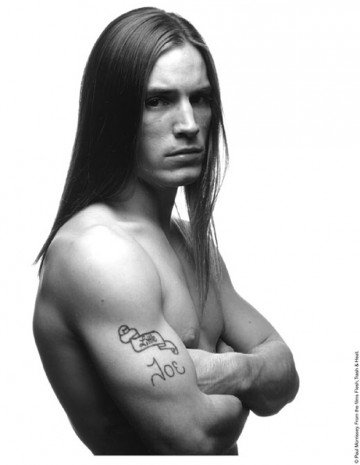
Originally published in the Northside San Francisco in June 2009
Joe Dallesandro’s new biopic “Little Joe” hits the big screen this month in San Francisco
He forever changed male sexuality in the cinema. —John Waters
Everyone knows Joe Dallesandro. He’s best known for his roles in the Andy Warhol films Heat, Trash and Flesh and for his involvement in the late sixties Factory scene as one of Warhol’s “Superstars.” Over the years, Joe has appeared in many diverse acting roles. He was a gangster in Francis Ford Coppola’s Cotton Club and played a comic role as a religious fanatic in John Water’s Cry Baby. Little Joe casts a large shadow over popular culture. His naked torso graces the cover of the first album by The Smiths, and a famous photo of his lower torso not so concealed in a pair of tight jeans caused a sensation on the cover of the Rolling Stone’s Sticky Fingers album. Remember the verse dedicated to Joe in Lou Reed’s song from 1972, Walk on the Wild Side? “Little Joe never once gave it away…” Now Joe is ready to give away a glimpse into his story. Dallesandro has spent the last five years working on a biopic called Little Joe which premiers in San Francisco next month at the Filmline festival. He spoke with the Northside in an interview leading up to the premiere.
Regarding the documentary Little Joe: Tell us something about the history of this film project and the extent of your involvement in the film.
The Little Joe production began in 2005 by myself, Vedra Mehagian and Christos Moisides. We added Nicole Haeusser, a Student Emmy and Directors Guild of America award winning Director and graphic artist/designer Shawn “Blue” Bayer to the team to complete this piece. We finished final editing the day before we all stepped on the plane to the Teddy Awards in Berlin. (Joe received a Teddy award—a film award for movies with LGBT content- in February of this year.)
The film premiered at the Berlin International Film Festival on February 10, 2009. What was the audience’s reaction to Little Joe?
They loved the film. I’ve seen reviews from several European publications and The Hollywood Reporter and there have been nothing but wonderful reviews of the film. We’re all really excited about the positive press we’ve received since it’s been such a long journey.
Many of your film roles feature character-driven plots. What kinds of challenges present themselves to actors when so much of the story is riding on an individual’s personality?
Well, that is really up to the eye of a great casting person. Especially with the Warhol films, Paul Morrissey had an eye to spot the right people to do the part he had in mind. It’s all in the casting.
What has been your favorite film role?
I love all the work I’ve done for different reasons. The films I did with Paul Morrissey for Andy Warhol led to the work I did in Europe with all the fantastic people I worked with there. When I returned to the US in the early 1980’s a new chapter started for me. I have said that I loved working with Serge Gainsbourg and Jane Birkin on the film Je t’aime Moi Non Plus. They were a very exciting couple and it was a very sexy, exciting project. It was a great time.
You’re known as a sex symbol not only in the film world but also within gay culture. How do you feel about this affiliation and how has it affected your life?
I don’t decide that I’m a sex symbol to the film world or within gay culture. I don’t make that decision, that is decided on by the people that watch the films. My job always is to just appear, be prepared and do my small job as an actor. I know I have a large gay following and I appreciate them like I do all my fans. We have all been through a long journey together and a lot of people use my career in film to reminisce about what was going on in their lives when this film or that film came out.
Tell us about your current creative projects, including your new merchandising line at joedallesandro.com.
Kim, my wife, is working on the merchandising. I really wanted to find exciting artists and ask them if I could run small limited editions of their work so my audience would see what they’re doing. I like the idea of supporting artists and I’m currently looking for a few more artists to work with. I have also considered curating a show featuring selected artists and moving it to galleries in both the US and Europe. This project is a little more problematic. Most galleries are interested in me and when I say it’s about this artist or that artist, they seem to get confused. I’m still trying to get this to work. I love animation would love to do a film in this genre. I’d also like to write a children’s book.
After seeing Little Joe, what will audiences have learned about Joe Dallesandro as a person versus Joe the sex symbol and Warhol superstar?
I’m just a person like you or anyone in the world. I just happened to become an actor and I’ve had some good photos taken of me. I get up and work every day like everyone else. I have the same problems as anyone.
In closing, do you have a particular message that you’d like to leave with our readers?
I’d like people to know that especially right now it’s a good time to start doing something for people who are less fortunate.
Little Joe will screen Saturday, June 20th at 4:15 p.m. at the Frameline Film Festival.